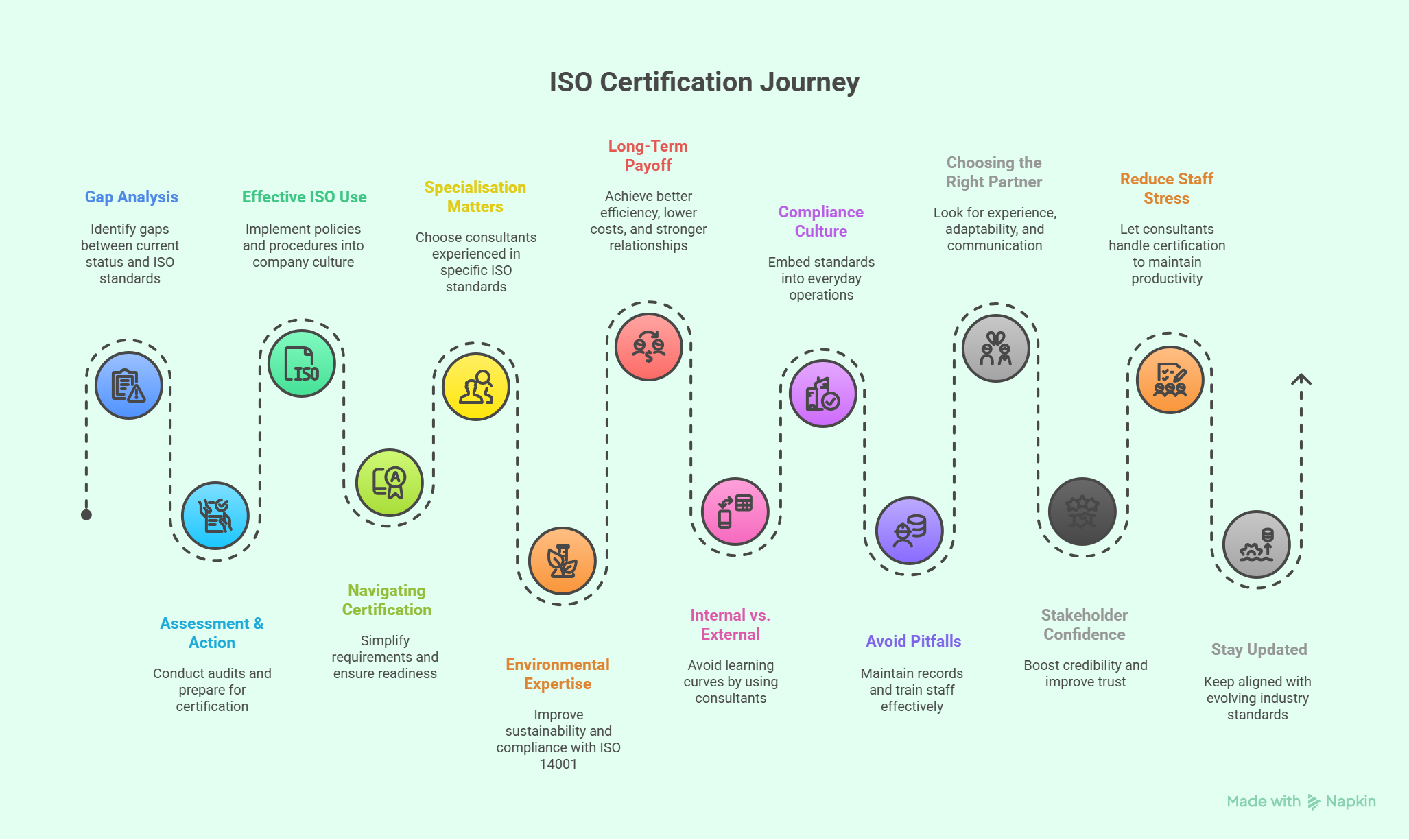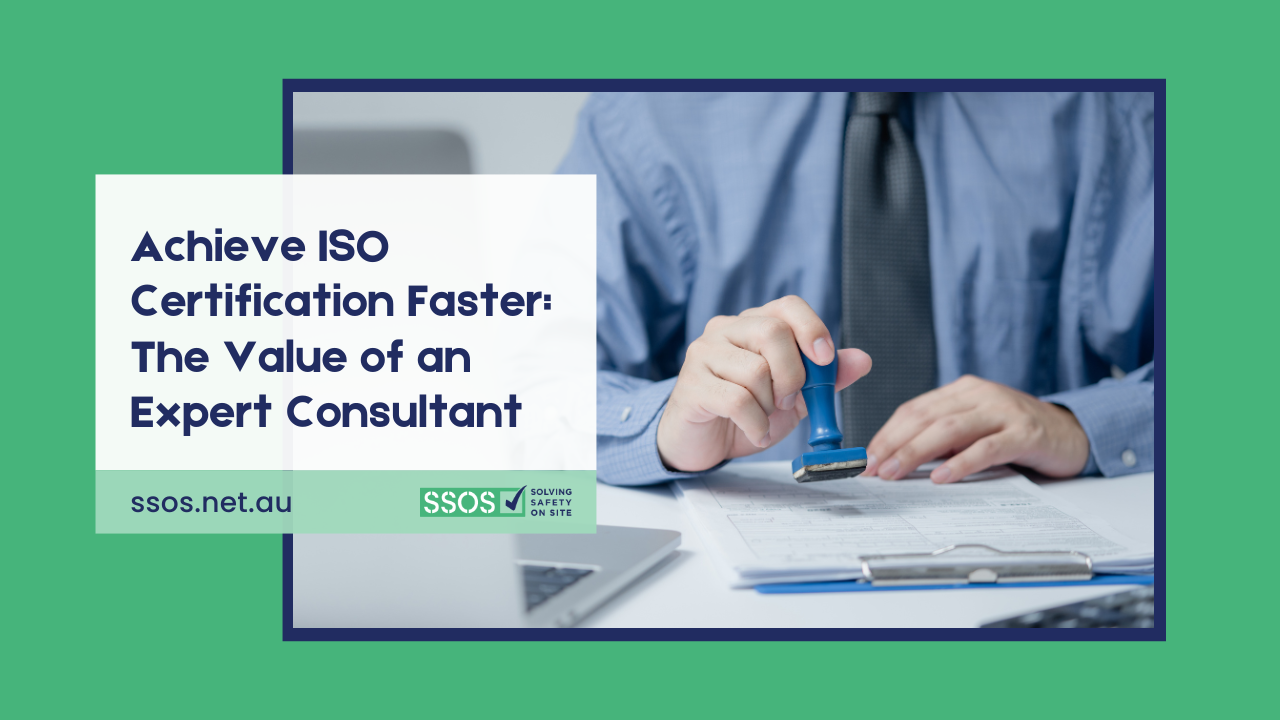Achieve ISO Certification Faster: The Value of an Expert Consultant
For many organisations, the journey toward ISO certification feels like navigating a maze without a map. Between understanding the standards, creating the right documentation, and ensuring compliance at every level of the business, the process can be overwhelming. This is precisely where an ISO consultant comes into the picture. Instead of worrying about how to meet the requirements, businesses will have a partner who will help them translate these requirements into practical steps that they need to implement in their everyday operations.
• What Does an ISO Consultant Do?
In a nutshell, the primary duty of an ISO consultant is to harmonise the technical nature of compliance and the practical operation of a business. These experts can read through the jargon-laden ISO standards and translate them into practical steps your workforce would easily understand. Additionally, independent consultants assist businesses by assessing systems and processes to ensure they meet the requirements of the intended standard. Consequently, the expert has to train relevant employees on compliance requirements, identify areas of deficiency and recommend the necessary changes, which may entail overhauling operational processes.
• Why Do Businesses Employ a Consultant?
Businesses across diverse sectors, from manufacturing to service delivery, are recognising the benefits of engaging an ISO consultant. Some professionals prefer it because it is time-saving, while others use it to avoid costly errors that may hinder certification. An external consultant who is an expert in their field will see the problems that your employees do not notice. Their insights often lead to process improvements that continue to benefit the business long after certification is achieved.
• The Value of Independent Expertise
One of the main benefits of ISO consultants is impartiality. Internal teams, no matter how competent, can become blind to operational inefficiencies simply because they’re used to “how things are done.” A consultant brings fresh eyes and isn’t influenced by internal politics or historical decision-making. This objectivity allows them to recommend changes that are in the organisation’s best interest, even if those changes challenge long-standing habits.
Key Stages of the Certification Journey

The path to certification is often broken down into a few critical stages, each of which is guided by the consultant.
1. The Importance of a Gap Analysis
To achieve certification, first, you must determine your current status. This is where an ISO gap analysis comes in. This assessment aligns your existing workflows with an applicable ISO standard, outlining the areas that require attention. It is an essential preliminary step due to its precision and practicality. Without it, you run the danger of reallocating resources to efforts that won’t in any way get you closer to compliance.
2. Assessment and Action
With the gaps identified, the next step is to resolve them. This Stage usually requires an ISO internal audit, which is the certification audit done by your consultant for your organisation. This internal audit is advantageous in that it allows you to test your organisational readiness, as well as provides a chance to resolve any pending issues before the official auditors audit the organisation. This rehearsal boosts your odds of certifying on your first try tremendously.
3. Use ISO Standards Effectively
The steps and actions taken to conform to ISO standards are usually through policies and procedures. This is where the majority of businesses are off to the implementation. It becomes difficult to realise the policies and procedures that are set in place as part of the culture of the organisation. This is why the help of a specialised consultant is of the utmost importance.
4. Navigating the Certification Process
For organisations unfamiliar with the steps involved, the ISO certification process can seem like an endless checklist of technical requirements. A consultant helps demystify each phase, from documentation and training to audits and final approval. More importantly, they ensure you avoid common pitfalls that can lead to delays or rejections, such as incomplete documentation or inadequate staff training.
5. Specialisation Matters
Choosing the right consultant often depends on the standard you’re pursuing. For example, an ISO 9001 consultant focuses on quality management systems, ensuring your processes meet international benchmarks for delivering consistent, high-quality products or services. Their role extends beyond compliance — they help create systems that enhance customer satisfaction and operational efficiency.
6. Environmental Standards and Expertise
For organisations committed to environmental responsibility, an ISO 14001 consultant is the go-to expert. They specialise in environmental management systems, helping you reduce waste, manage resources efficiently, and comply with environmental regulations. This expertise not only supports certification but also positions your business as a responsible and forward-thinking organisation.
7. The Long-Term Payoff
Hiring an ISO certification consultant is an investment that continues to pay dividends long after the certificate is awarded. The systems, processes, and cultural changes implemented during the journey often lead to better efficiency, lower costs, and stronger customer relationships. Many businesses find that the benefits go far beyond compliance, influencing everything from staff morale to market competitiveness.
8. Internal vs. External Approaches
Some organisations consider handling certification internally to save costs. While this approach works for businesses with in-house expertise, most find that the learning curve is steep and time-consuming. Without guidance, the risk of failing the initial audit and having to repeat the process increases significantly. A consultant mitigates that risk by guiding you through the standards step-by-step, ensuring no requirement is overlooked.
9. Building a Compliance Culture
The true value of working with a consultant is that they don’t just help you achieve certification — they help embed compliance into your organisational DNA. This cultural shift ensures that standards are maintained long after the initial audit. Teams learn not just what to do but why it matters, which leads to more consistent quality and fewer compliance issues down the line.
10. Avoiding Common Pitfalls
The main reasons for the loss of certification are poor record keeping, lack of process harmonisation, and inadequate employee training. An experienced consultant is aware of these challenges and knows how to overcome them. Since they foresee problems before they occur, the organisation saves time and money.
11. Make the Right Choice
Look at their experience, track record, and communication style. Consider the following factors when choosing a partner to help you on the path toward certification: The consultant must also be able to adjust their approach based on the specific needs of your business, rather than applying a generic solution.
12. Boosting Stakeholder Confidence
ISO-certified companies are appreciated by customers, investors, and regulators. A consultant’s assistance renders the exercise more efficient and thorough, which boosts the company’s credibility. Consequently, new business opportunities and partnerships become available, which would otherwise not be possible.
13. Minimising Operational Stress
Employees, who are often already overburdened by the responsibilities of their roles, would have to prepare for and undertake certification courses. When a consultant is hired, employees are at liberty to focus on their work and still meet the desired certification goals. In this regard, the employees are motivated and thus remain highly productive.
14. Staying Informed on Regulatory Changes
The criteria are regularly updated to reflect the latest industry practices and priorities. An IT consultant ensures that your systems are up-to-date by monitoring these changes. When they upgrade, you will not be in a rush to incorporate new product aspects.
Final Words
ISO certification is more than just a box-ticking exercise — it’s a chance to strengthen your organisation’s systems, reputation, and long-term prospects. Whether you’re aiming for quality, environmental, or other standards, partnering with an experienced consultant can turn a daunting process into a manageable, even rewarding, journey. By investing in expert guidance, you’re not just working toward a certificate — you’re building a foundation for sustainable success.






